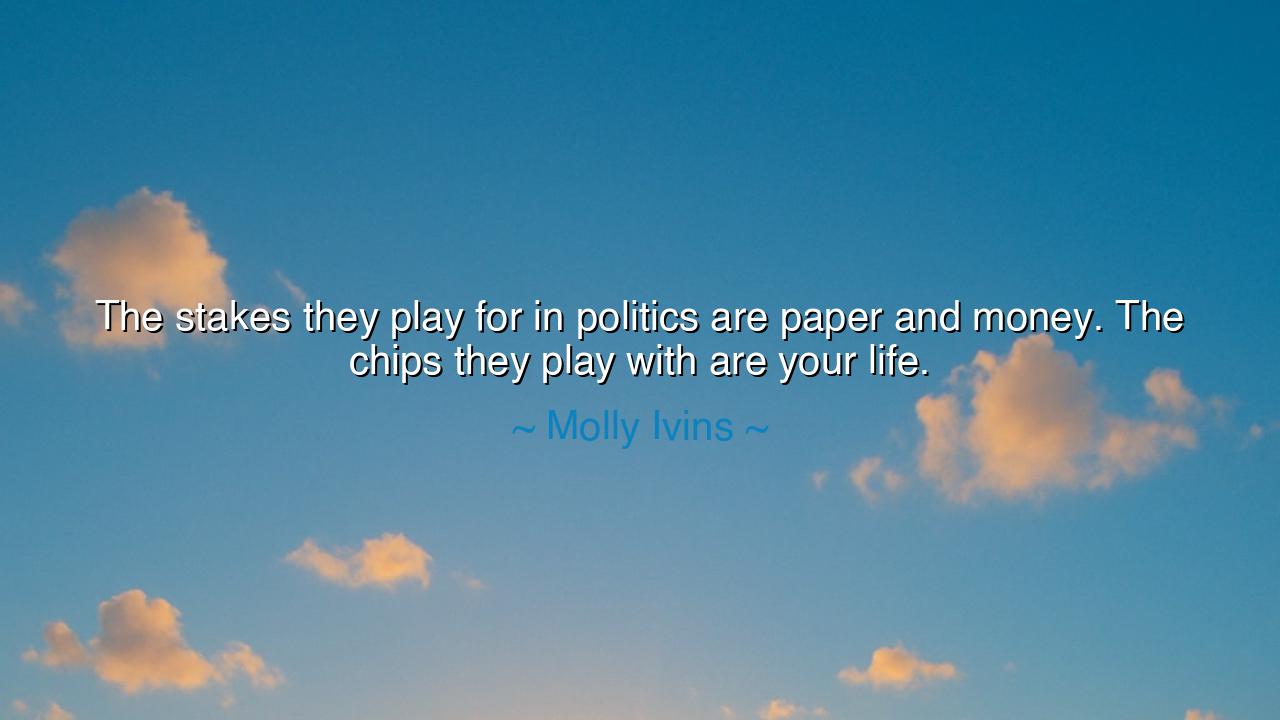
The stakes they play for in politics are paper and money. The
The stakes they play for in politics are paper and money. The chips they play with are your life.






The words of Molly Ivins — “The stakes they play for in politics are paper and money. The chips they play with are your life.” — thunder as both warning and lament. She unmasks the brutal truth that while rulers and politicians speak of budgets, bills, and balance sheets, the true cost of their games is borne by the people themselves. For what appears as paper and money to those in power is, in truth, the sweat, health, and survival of ordinary men and women.
The meaning of her words is a revelation of perspective. To the politician, policies may seem like strategies in a game, pieces moved upon a board of economics and law. But to the common person, those same moves determine whether their children eat, whether they work or starve, whether they live or die in war. Thus Ivins reminds us that politics is never abstract. Behind every law and budget lie human lives, and when leaders forget this, their governance turns into cruelty disguised as calculation.
History offers us countless examples. Consider the Great Depression of the 1930s, when financial collapse was spoken of by leaders in terms of markets and numbers. Yet for millions of families, those “chips” meant hunger, homelessness, and despair. Or recall the wars waged by empires, where rulers sought territory and wealth, while soldiers and peasants spilled their blood. In these moments the truth of Ivins’ words was carved in stone: the chips are your life.
The origin of her declaration lies in her life as a journalist, unafraid to strip pomp and pretense from the powerful. Molly Ivins spoke with the fire of one who would not let the people forget that they are not spectators in this game, but its very currency. She sought to pierce the veil of indifference, to awaken ordinary citizens to the reality that their lives are at stake in the contests of power.
Therefore, O children of tomorrow, mark these words: never believe that politics is a distant game played by others. The board may be set with paper and money, but the wagers are made with your days, your labor, your future. Demand that those who lead remember the weight of the chips they hold, and do not surrender your voice. For only when the people rise to guard their own worth will politics cease to gamble with their very lives.






TKMai the khuong
This quote by Ivins is a sharp reminder of the personal toll politics can have on everyday people. Politicians seem to be more concerned with their own gains—whether financial or power-based—while the impact of their decisions can be devastating to those who have no say in the matter. How do we bridge this gap in our political system, ensuring that the voices of ordinary citizens are heard and that their lives are not treated as mere ‘chips’ in a game?
KNLe Nguyen Khanh Ngoc
Molly Ivins’ quote resonates deeply, especially in today’s political climate. It’s troubling to think that for some politicians, the game is all about wealth and power, with little regard for the human consequences. What does this say about our current political system? Can we change the focus of politics from short-term profit to long-term benefit for the people? How can we make sure the real ‘chips’—people’s lives—are prioritized in political decisions?
2P27_Thu Phuong
Ivins’ statement really makes me think about the gap between political elites and the everyday people they’re meant to represent. When decisions are made for the sake of money or personal gain, how can we trust that our leaders are acting in the public’s best interest? What would it take to shift the focus from profit-driven politics to one that truly serves and protects the lives of those affected by these decisions?
HHHan han
Molly Ivins’ quote is a powerful critique of the disconnect between political decision-makers and the lives of the people they govern. It’s eye-opening to think that while politicians play games with money and power, the real consequences of their decisions fall on ordinary people’s lives. How do we hold politicians accountable when their choices seem disconnected from the struggles of the general public? Shouldn’t we demand more empathy and responsibility from those in power?